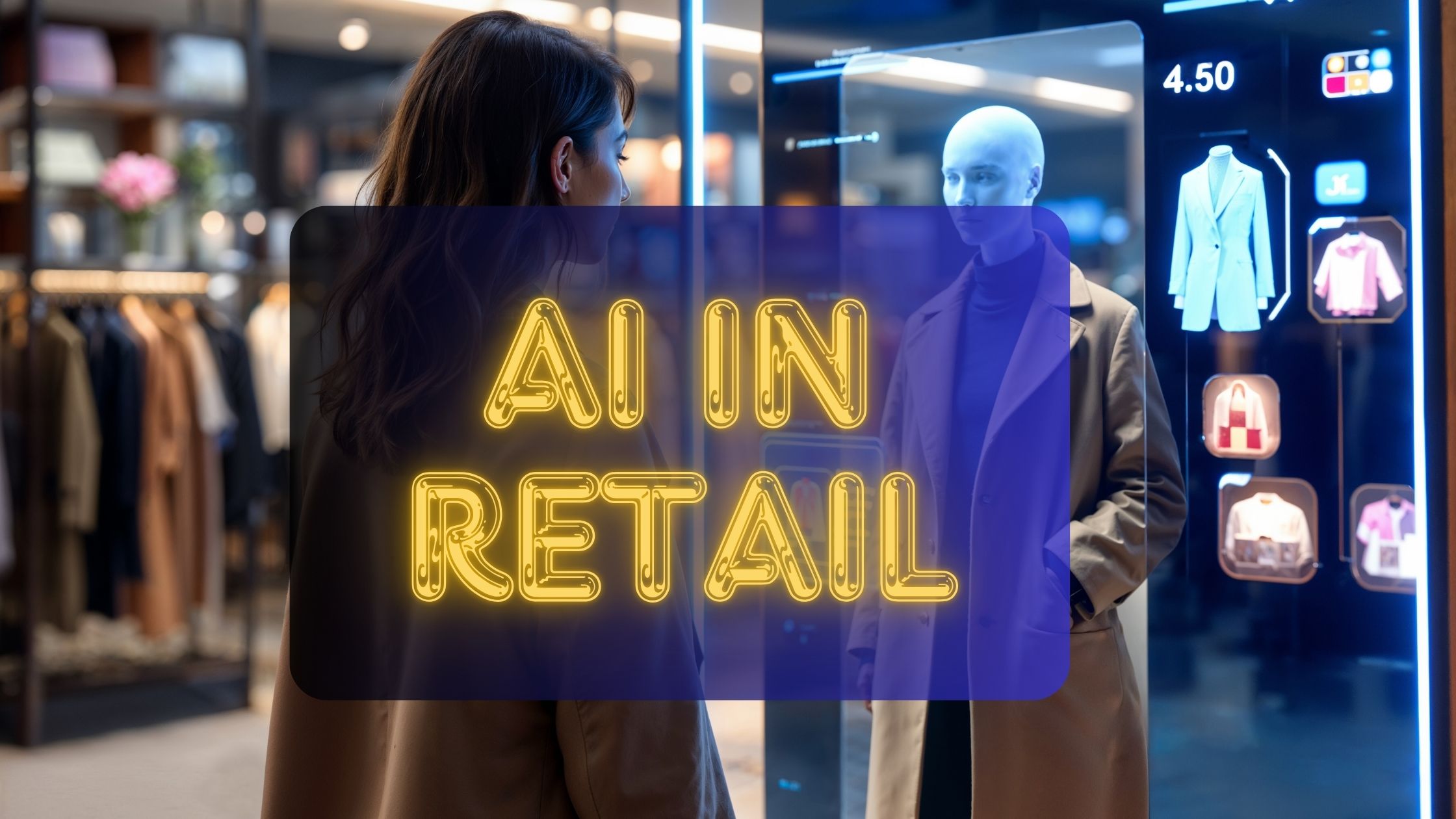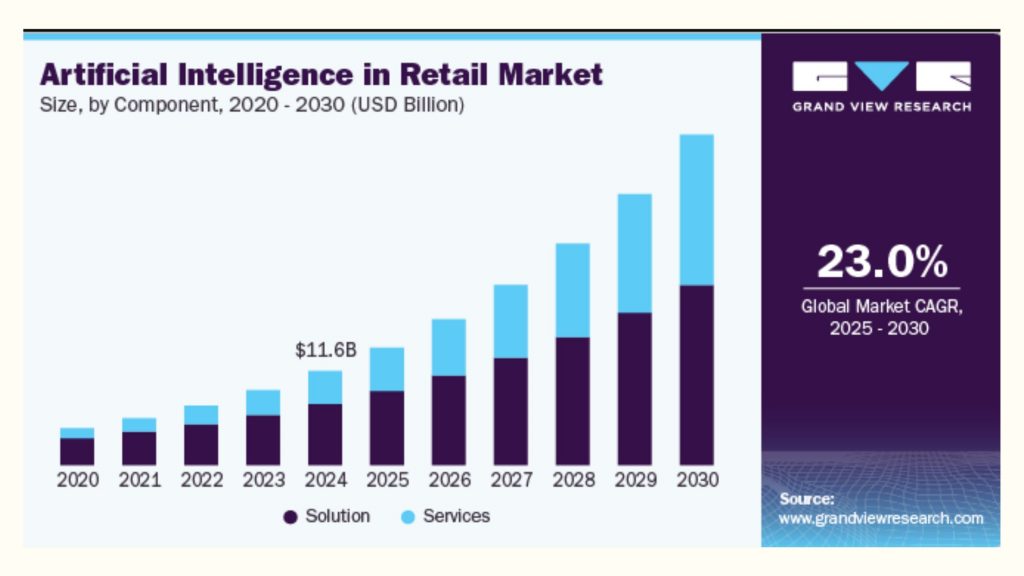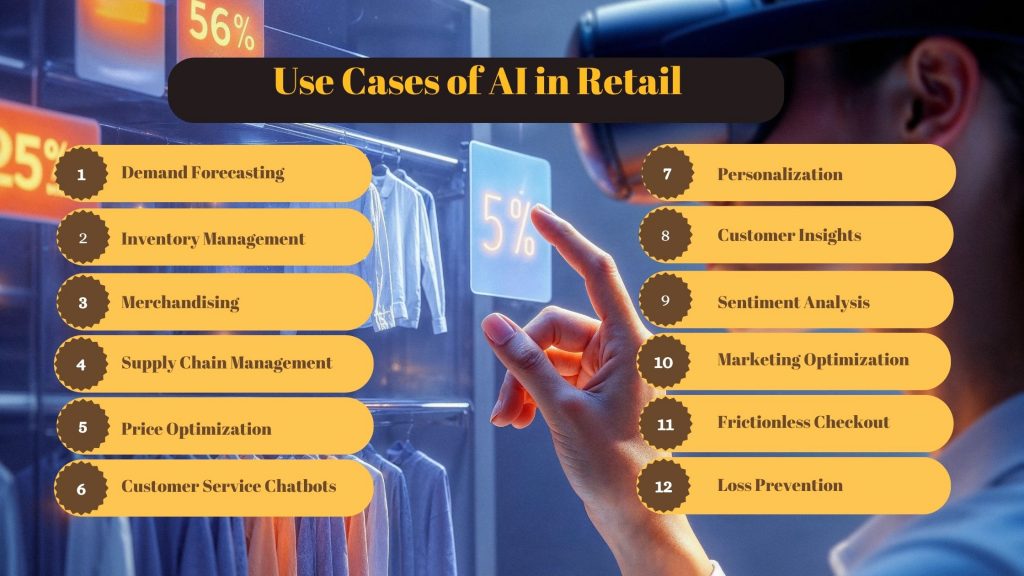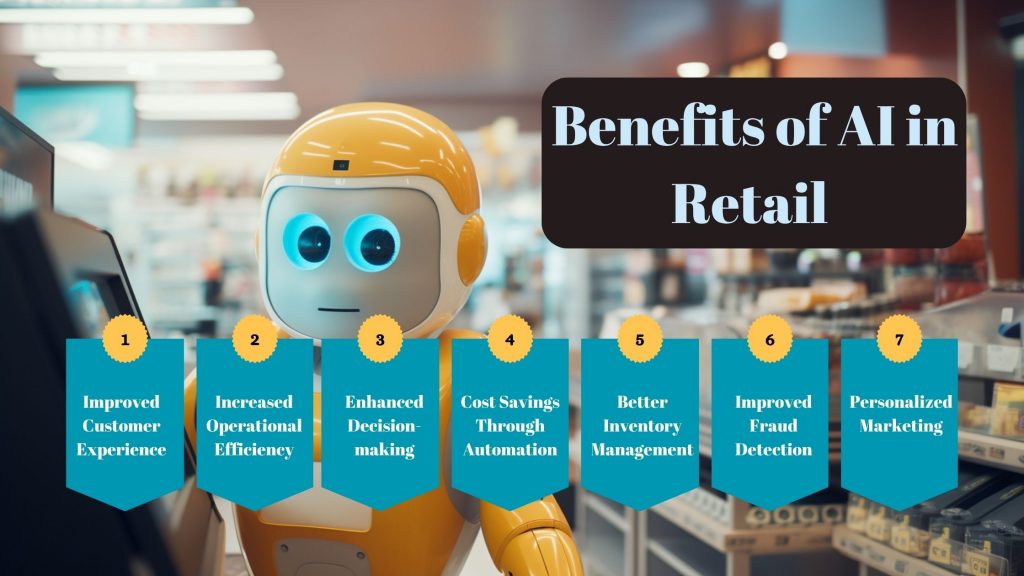
A Complete Guide to AI in Retail and How It’s Changing the Industry

Blog Summary:
This blog explores how AI is reshaping the retail industry with smarter operations and data-driven decision-making. It highlights key trends, real-world applications, and business benefits of using AI across retail functions.
The retail industry has always been a dynamic and competitive space, but with the rise of digital technologies, it has entered a new era—one driven by data, automation, and customer-centric innovation. Among the most transformative technologies reshaping the landscape is AI in Retail. From personalized shopping experiences to automated inventory management, retail AI solutions are no longer futuristic—they’re becoming a standard for survival and success.
Today’s consumers expect more: faster service, personalized offers, real-time support, and seamless omnichannel experiences. Retailers that fail to meet these expectations risk falling behind. That’s where AI in the retail industry comes into play. By leveraging machine learning algorithms, natural language processing, and predictive analytics, businesses can gain a 360-degree view of their customers while optimizing operations at every level.
Whether it’s understanding shopping behaviors through retail marketing, enhancing supply chain operations with logistics AI, or improving fraud detection, artificial intelligence offers actionable insights and intelligent automation that can fuel growth. As we delve deeper into the use cases, benefits, and trends shaping AI in retail, it’s clear that this technology is not just an option—it’s a necessity for those aiming to lead in a competitive marketplace.
Artificial Intelligence In Retail Market Trends
The global AI in retail market was valued at USD 11.61 billion in 2024 and is projected to grow at a CAGR of 23.0% from 2025 to 2030. This growth is driven by the rising number of internet users, increasing use of smart devices, demand for in-store surveillance, and government support for digitization.

Retailers are embracing AI to meet evolving customer expectations and optimize operations. Key trends include:
- Generative AI adoption for content creation and chatbots
- Omnichannel personalization through real-time data
- Visual and voice shopping for a better user experience
- Smart inventory management for sustainability
- Responsible AI practices for data transparency
These trends highlight how retail AI solutions are shaping a more efficient, personalized, and future-ready retail industry.
How AI is Changing the Retail Industry
Artificial Intelligence is redefining how retailers operate, interact with customers, and make decisions. By embedding intelligent systems into daily workflows, AI in the retail industry is moving from reactive strategies to predictive and proactive models that enhance customer satisfaction and business outcomes.
One of the most significant transformations is in customer experience. AI enables retailers to offer personalized product recommendations, predict buying behavior, and tailor marketing messages based on real-time data. This level of personalization boosts customer loyalty and increases sales conversions.
On the operational side, retail AI is streamlining supply chain logistics, automating inventory management, and improving demand forecasting. Tasks that once required hours of manual analysis are now handled by algorithms that learn and adapt with every data input, making operations faster and more accurate.
In physical stores, AI is being used for smart shelf management, surveillance, and checkout-free shopping experiences. These innovations not only reduce labor costs but also enhance security and efficiency.
In retail marketing, AI helps businesses deliver more targeted campaigns, optimize ad spend, and uncover customer insights that would be difficult to detect manually. By analyzing massive amounts of data, AI identifies patterns that inform smarter strategies.
From backend logistics to front-end customer engagement, AI is reshaping the retail landscape into a smarter, more connected ecosystem. Retailers leveraging these innovations are not only improving profitability but also gaining a competitive edge in a rapidly evolving market.
Want to Stay Ahead with Retail AI Innovations?
Discover how smart retail AI solutions can elevate your business strategy.
12 Use Cases of AI in Retail

Artificial Intelligence services are transforming the retail sector through intelligent automation, data-driven insights, and enhanced customer engagement. Here are 12 practical use cases of AI in retail, starting with the first three:
Demand Forecasting
Accurate demand forecasting is crucial in retail to avoid overstocking or stockouts. With AI-powered models, retailers can now analyze vast amounts of historical sales data, seasonal trends, customer behavior, and even external factors like weather or market conditions. These algorithms not only predict demand with higher accuracy but also adapt over time as new data becomes available.
For example, a fashion retailer can use AI procurement to forecast which apparel lines are likely to trend in an upcoming season, allowing for smarter purchasing decisions. This minimizes waste and ensures shelves are stocked with the right products at the right time.
Inventory Management
Closely linked to forecasting is AI-driven inventory management. Traditional inventory systems often fail to account for fast-changing market dynamics. AI automates this process by tracking stock levels in real time and suggesting reorders when necessary. It can also balance inventory across multiple channels—online, warehouse, and brick-and-mortar stores—reducing the risk of surplus or shortages.
Retailers like Walmart and Target are leveraging retail AI solutions to streamline stock replenishment and ensure optimal inventory flow, especially during peak seasons.
Merchandising
AI is revolutionizing how products are displayed and promoted both online and in-store. Using computer vision and predictive analytics, AI can analyze customer preferences, product performance, and browsing behavior to determine which products should be featured, bundled, or marked for promotion.
For instance, in eCommerce, AI can dynamically rearrange product pages based on a shopper’s browsing history or location. In physical stores, AI tools can track shelf activity and suggest better product placements to maximize visibility and sales.
These first three use cases illustrate how AI in retail is helping businesses become more efficient, responsive, and customer-centric.
Supply Chain Management
AI in supply chain is bringing agility and precision to retail operations. Traditional systems often struggle with inefficiencies, delays, and lack of real-time visibility. With AI, retailers can monitor the entire process end-to-end, identify bottlenecks, and even predict disruptions before they occur.
By analyzing data from suppliers, logistics partners, weather patterns, and geopolitical events, AI-powered systems can recommend optimal routes, adjust shipping schedules, and ensure timely delivery. This helps in reducing transportation costs, improving fulfillment speed, and maintaining product availability across all channels.
For example, AI in retail is being used to simulate “what-if” scenarios, helping managers make informed decisions quickly when unexpected challenges arise.
Dynamic Price Optimization
AI enables retailers to move beyond static pricing strategies and embrace dynamic pricing models. By continuously analyzing factors like competitor pricing, demand fluctuations, customer behavior, and inventory levels, AI tools can suggest the most profitable price points in real time.
This ensures that products remain competitively priced without compromising on margins. For example, during high-demand periods, prices can be increased automatically, while low-performing products may be discounted to clear stock faster.
Retailers like Amazon and Zara use AI for real-time price optimization, helping them stay ahead in a highly competitive environment and meet customers’ pricing expectations without manual intervention.
Customer Service Chatbots
AI-powered chatbots have become essential for enhancing customer service in retail. These virtual assistants provide 24/7 support, handling everything from answering FAQs and processing returns to tracking orders and recommending products.
Unlike basic rule-based bots, modern AI chatbots use natural language processing (NLP) to understand customer queries, respond contextually, and even escalate complex issues to human agents when needed.
Integrating retail AI chatbots reduces wait times, cuts support costs, and improves the overall shopping experience. It also ensures consistent and personalized service across platforms, whether it’s on a retailer’s website, app, or social media.
Personalization and Dynamic Outreach
AI enables retailers to deliver highly personalized shopping experiences by analyzing customer preferences, purchase history, and browsing behavior. This allows brands to tailor product recommendations, promotions, and content dynamically, increasing customer engagement and loyalty.
Dynamic outreach also means reaching customers with the right message at the right time across channels like email, mobile apps, and social media. For example, AI-powered marketing platforms can automatically adjust campaigns based on real-time customer responses, maximizing relevance and conversion rates.
Customer Insights and Engagement
Retailers use AI to gather deep insights into customer behavior and preferences by processing large volumes of data from multiple sources, including online interactions, in-store visits, and social media.
These insights help businesses understand buying patterns, segment customers effectively, and create targeted marketing strategies. Enhanced engagement comes from predictive analytics that anticipates customer needs and suggests proactive offers or services.
You Might Also Like:
How AI in Fitness Industry is Shaping Smarter Workouts and Wellness?
Sentiment Analysis
AI-powered sentiment analysis tools scan customer reviews, social media posts, and feedback to understand public perception of products, brands, or campaigns. By identifying positive, negative, or neutral sentiments, retailers can quickly respond to issues, improve product offerings, and adjust marketing messages accordingly.
This real-time monitoring supports brand reputation management and helps companies stay aligned with customer expectations.
Marketing Optimization
AI in marketing analyzes vast amounts of data to identify the most effective strategies and channels. It helps retailers optimize ad spend, create targeted campaigns, and predict customer responses. By automating A/B testing and content recommendations, AI ensures marketing efforts are both efficient and impactful, driving higher ROI.
Frictionless Checkout
AI-powered technologies are transforming the checkout experience by enabling faster, smoother, and contactless payment options. Solutions like cashier-less stores, mobile payments, and facial recognition speed up transactions and reduce queues. This not only improves customer satisfaction but also lowers operational costs.
Loss Prevention
Retailers use AI to combat theft and fraud by monitoring transactions, customer behavior, and store surveillance in real time. AI systems can detect unusual patterns indicative of shoplifting or employee fraud and alert staff immediately. This proactive approach reduces losses and enhances overall store security.
Looking to Maximize Sales with AI?
Find out how AI-powered retail marketing drives smarter, targeted campaigns.
Benefits of AI in Retail – 7 Key Advantages

The adoption of AI in retail is not just a technological upgrade but a strategic transformation that drives measurable results. By integrating AI-driven solutions, retailers gain numerous advantages that improve everything from customer satisfaction to operational efficiency. Let’s explore seven key benefits that showcase how AI in retail industry is reshaping business performance and customer engagement.
Improved Customer Experience
AI enables retailers to offer personalized shopping journeys by analyzing customer data and preferences. This means customers receive tailored recommendations, promotions, and support, which increases satisfaction and loyalty. Additionally, AI-powered chatbots provide instant assistance, ensuring shoppers get help anytime without waiting. Enhanced personalization combined with seamless service significantly boosts overall customer experience.
Increased Operational Efficiency
By automating routine tasks such as inventory tracking, demand forecasting, and supply chain management, AI reduces manual effort and human error. Retailers can operate more smoothly with real-time data and predictive insights guiding decisions. This efficiency frees up staff to focus on higher-value activities, improving productivity and responsiveness to market changes.
Enhanced Decision-making
AI processes massive amounts of data quickly, delivering actionable insights that help retailers make smarter decisions. From pricing and merchandising to marketing and logistics, AI supports evidence-based strategies. Retailers benefit from improved accuracy in forecasting trends and customer behavior, leading to better business outcomes and reduced risks.
Cost Savings Through Automation
Automating repetitive processes with AI leads to significant cost reductions in labor, inventory management, and operations. Retailers can avoid overstocking or stockouts, reducing waste and storage costs. AI-powered systems also help detect fraud and theft early, preventing financial losses. Overall, automation helps retailers optimize resources while maintaining service quality.
Better Inventory Management
AI enhances inventory control by providing real-time visibility and accurate demand predictions. Retailers can balance stock across multiple channels and locations, minimizing excess inventory and shortages. This optimization results in smoother operations, improved cash flow, and a better shopping experience as products are available when customers want them.
Improved Fraud Detection
AI algorithms monitor transactions and customer activities to identify suspicious patterns indicative of fraud or theft. This proactive approach enables retailers to quickly respond to potential threats and minimize losses. AI-driven fraud detection systems are more effective than traditional methods, as they learn and adapt to new tactics continuously.
Personalized Marketing and Increased Sales
AI helps create highly targeted marketing campaigns by analyzing customer behavior and preferences. Personalized offers and recommendations drive higher engagement and conversion rates. By reaching customers with relevant messages at the right time, retailers can boost sales, strengthen brand loyalty, and enhance overall marketing effectiveness with smart retail AI solutions.
The Future of AI in the Retail Industry
As technology continues to evolve rapidly, the role of AI in retail is set to expand even further, transforming how retailers operate and engage with customers. The future of AI in retail promises smarter, more intuitive solutions that will enhance every stage of the shopping journey, from supply chain logistics to personalized marketing and beyond.
Emerging trends like augmented reality (AR) shopping experiences, advanced voice assistants, and AI-driven sustainability initiatives are just the beginning. Retailers investing in retail AI today are positioning themselves to lead in innovation and customer satisfaction tomorrow.
With ongoing advancements in machine learning, natural language processing, and computer vision, AI will enable retailers to predict trends more accurately, optimize inventory dynamically, and create seamless omnichannel experiences that meet the expectations of modern consumers.
The integration of AI with 5G and IoT devices connectivity will further accelerate data-driven decision-making, providing real-time insights and enabling more agile responses to market changes. This evolution will also foster new opportunities for personalized outreach and automated customer service.
In short, the future of AI in the retail industry is not only about efficiency but also about creating meaningful, personalized, and frictionless experiences that keep customers coming back.
How BigDataCentric Custom AI Solutions Can Help You Transform Your Retail Business?
In today’s competitive retail landscape, leveraging advanced AI technologies is essential to staying ahead. BigDataCentric offers tailor-made retail AI solutions designed to address your unique business challenges and goals. Our expertise spans across developing intelligent systems that improve demand forecasting, inventory management, personalized marketing, and customer engagement.
With BigDataCentric’s custom AI solutions, you can automate complex processes, reduce operational costs, and enhance decision-making with actionable insights. We focus on building scalable AI models that evolve with your business, ensuring you continuously deliver exceptional customer experiences while optimizing internal operations.
Our AI-driven tools also enable real-time data analysis, helping you react swiftly to market trends and customer needs. From integrating smart chatbots for improved customer service to deploying dynamic pricing strategies, BigDataCentric empowers your retail business to operate more efficiently and profitably.
Partnering with us means gaining access to cutting-edge AI technologies combined with personalized support, ensuring your retail business transforms seamlessly in the evolving digital era.
Need Help with AI in Retail Integration?
Our expert teams ensure smooth AI adoption tailored to your retail needs.
The Bottom Line
Artificial intelligence is no longer just a futuristic concept; it is a powerful reality reshaping the retail industry today. From improving customer experiences to streamlining operations, AI in retail offers transformative benefits that can drive growth and competitive advantage. As the retail landscape becomes more complex and customer expectations rise, integrating AI in retail industry solutions is essential for staying relevant and successful.
By adopting AI technologies, retailers can gain deeper insights, optimize processes, and deliver personalized, seamless shopping experiences that keep customers loyal. Whether it’s through better inventory management, dynamic pricing, or advanced marketing strategies, the potential of AI in retail is immense and still growing.
Connecting with experts like BigDataCentric ensures your business leverages the right AI tools tailored to your specific needs, enabling you to thrive in the digital age. The future of retail is intelligent, efficient, and customer-centric — and AI is at the heart of this transformation.
FAQs
-
What are the challenges of implementing AI in the retail sector?
Challenges include high implementation costs, data privacy concerns, integration with existing systems, lack of skilled talent, and resistance to change within organizations.
-
Can AI help prevent retail fraud and theft?
Yes, AI can detect unusual transaction patterns and suspicious behavior using advanced analytics and real-time monitoring, helping to reduce fraud and theft effectively.
-
Can AI improve inventory management in retail stores?
Absolutely. AI forecasts demand accurately, optimizes stock levels, reduces overstock or stockouts, and automates replenishment, leading to better inventory control.
-
Can AI help with dynamic pricing in retail?
Yes, AI analyzes market trends, competitor prices, and customer behavior in real time to adjust prices dynamically, maximizing profits and improving competitiveness.
-
How is Walmart using AI?
Walmart leverages AI for inventory management, supply chain optimization, cashier-less checkout, personalized shopping experiences, and predictive analytics to enhance efficiency and customer satisfaction.

About Author
Jayanti Katariya is the CEO of BigDataCentric, a leading provider of AI, machine learning, data science, and business intelligence solutions. With 18+ years of industry experience, he has been at the forefront of helping businesses unlock growth through data-driven insights. Passionate about developing creative technology solutions from a young age, he pursued an engineering degree to further this interest. Under his leadership, BigDataCentric delivers tailored AI and analytics solutions to optimize business processes. His expertise drives innovation in data science, enabling organizations to make smarter, data-backed decisions.
Table of Contents
ToggleHere's what you will get after submitting your project details:
- A strict non-disclosure policy.
- Get in discuss with our experts.
- Get a free consultation.
- Turn your idea into an exceptional app.
- Suggestions on revenue models & planning.
- No obligation proposal.
- Action plan to start your project.
- We respond to you within 8 hours.
- Detailed articulate email updates within 24 hours.
Our Offices
USA
500 N Michigan Avenue, #600,Chicago IL 60611




